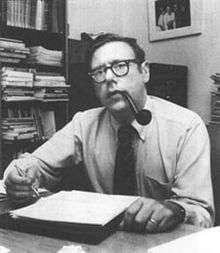Arthur Melvin Okun
| Art Okun | |
|---|---|
 | |
| Chair of the Council of Economic Advisers | |
|
In office February 15, 1968 – January 20, 1969 | |
| President | Lyndon Johnson |
| Preceded by | Gardner Ackley |
| Succeeded by | Paul McCracken |
| Personal details | |
| Born |
November 28, 1928 Jersey City, New Jersey, U.S. |
| Died |
March 23, 1980 (aged 51) Washington, D.C., U.S. |
| Political party | Democratic |
| Alma mater | Columbia University |
|
Academic career | |
| Institution | Yale University |
| Field | Macroeconomics |
| School or tradition | Neo-Keynesian economics |
| Influences | John Maynard Keynes |
| Influenced | Bill Mitchell |
| Contributions |
Okun's law Misery index |
Arthur Melvin "Art" Okun (November 28, 1928 – March 23, 1980) was an American economist. He served as the chairman of the Council of Economic Advisers between 1968 and 1969. Before serving on the C.E.A., he was a professor at Yale University and, afterwards, was a fellow at the Brookings Institution in Washington, D.C. In 1968 he was elected as a Fellow of the American Statistical Association.[1]
Okun is known in particular for promulgating Okun's law, an observed relationship that states that for every 1% increase in the unemployment rate, a country's GDP will be roughly an additional 2% lower than its potential GDP. He is also known as the creator of the misery index.
Works
- Equality and Efficiency: The Big Trade Off (Washington, Brookings, 1975)
- Prices and Quantities: A Macroeconomic Analysis, see here (1981) ISBN 0-8157-6480-4
References
- ↑ View/Search Fellows of the ASA, accessed 2016-08-20.
External links
- Brookings Inst Bio and Obit
- Arthur M. Okun (1928–1980). The Concise Encyclopedia of Economics. Library of Economics and Liberty (2nd ed.). Liberty Fund. 2008.
- "Arthur Okun Publication List" (pdf). Retrieved 2015-09-18.
| Political offices | ||
|---|---|---|
| Preceded by Gardner Ackley |
Chair of the Council of Economic Advisers 1968–1969 |
Succeeded by Paul McCracken |
This article is issued from Wikipedia - version of the 10/19/2016. The text is available under the Creative Commons Attribution/Share Alike but additional terms may apply for the media files.